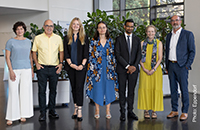

Eppendorf: Young European Investigators Award for Varun Venkataramani, accolade for Fena Ochs and Juliette Fedry
July 2025Eppendorf SE has been awarding its prestigious research prize for the 30th time. The independent jury chaired by Prof. Laura Machesky, Cambridge, UK, selected Varun Venkataramani, assistant doctor and postdoctoral researcher of Expermental Neuroncology at Heidelberg University Hospital, Germany as the winner of the Eppendorf Award for Young European Investigators 2025 with additional accolade for Fena Ochs, Group Leader at the Biotech Research & Innovation Centre (BRIC) of Københavns Universitet (DK) and Associate Professor at its Sundhedsvidenskabelige Fakultet (Health and Medical Sciences) as well as Juliette Fedry, Group Leader at the MRC Laboratory of Molecular Biology (Cellular proteostasis networks in physiology and diseases), Cambridge (UK). Varun Venkataramani receives the 20,000 Euro award for his research on how synaptic neuron-tumour networks can drive brain tumour progression. The jury acknowledged the importance of the emerging field of neuro-oncology and Dr Venka. Eppendorf: Eppendorf SE has been awarding its prestigious research prize for the 30th time. The independent jury chaired by Prof. Laura Machesky, Cambridge, UK, selected Varun Venkataramani, assistant doctor and postdoctoral researcher of Expermental Neuroncology at Universitätsklinikum Heidelberg (DE) the winner of the Eppendorf Award for Young European Investigators 2025 with additional accolade for Fena Ochs, Group Leader at the Biotech Research & Innovation Centre (BRIC) of Københavns Universitet (DK) and Associate Professor at its Sundhedsvidenskabelige Fakultet (Health and Medical Sciences) as well as Juliette Fedry, Group Leader at the MRC Laboratory of Molecular Biology (Cellular proteostasis networks in physiology and diseases), Cambridge (UK).
Varun Venkataramani receives the 20,000 Euro award for his research on how synaptic neuron-tumour networks can drive brain tumour progression. The jury acknowledged the importance of the emerging field of neuro-oncology and Dr Venkataramani’s role in unravelling how neurons and tumours interact and the translational potential of this work. Fena Och is honoured for her contribution to our understanding of how cohesin mediates sister chromatid cohesion. Juliette Fedry gets accolade for her use of innovative techniques to reveal how cellular stress controls protein translation
The Award Ceremony took place on July 3, 2025 at the Advanced Training Center of the European Molecular Biology Laboratory (EMBL)at Heidelberg.
In the photo (left to right):
Dr. Christine Christine Munz (CEO Eppendorf), Professor Sir Stephen Jackson (CRUK Cambridge Institute/ Uk Cancer Research, Dr. Fena Ochs, Dr. Juliette Fedry, Professor Laura Machesky, Jury Chair/Department of Biochemistry University Cambridge;, Dr. Axel Jahns, Vice President Corporate Citizenship & Governmental Affairs Eppendorf SE.
Source: Eppendorf SE
Disclaimer: You agree that B2Bioworld is not responsible and will not be held liable for any third party content on its sites or any third-party content, products or services available on other web sites accessed through links from B2Bioworld sites. Links to third-party sites are for your convenience only, and their inclusion on B2Bioworld\'s sites does not imply any endorsement, guarantee, warranty or representation by B2Bioworld.
Other articles recommended
B2Bioworld offers you background information
Inside the DNA Machine
MRC Scientist Kelly Nguyen wins prestigious Eppendorf Award. Unresolved questions remain, while Brexit is looming in UK research.
Maurice Michel - Living and Doing Science in Sweden
and being discovered by industry....
Do-it-yourself Pipette Inventor Honoured by Eppendorf
Neuroscience researcher Tom Baden creates his own tools, and pioneers visual information processing
Medical Innovation for Africa Only?
Book Review - open access